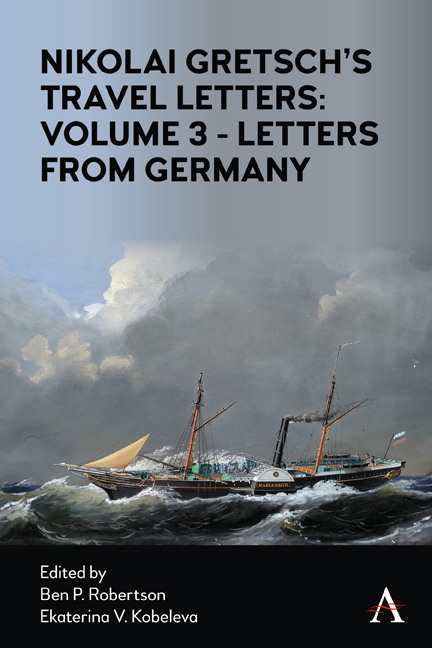Book contents
- Frontmatter
- Contents
- List of Illustrations
- Abbreviations
- Miscellaneous Frontmatter
- Introduction to Volume 3
- Letter XXXI
- Letter XXXII
- Letter XXXIII
- Letter XXXIV
- Letter XXXV
- Letter XXXVI
- Letter XXXVII
- Letter XXXVIII
- Letter XXXIX
- Letter XL
- Letter XLI
- Notes on this Translation
- Selected Bibliography
- Index
Introduction to Volume 3
Published online by Cambridge University Press: 22 October 2021
- Frontmatter
- Contents
- List of Illustrations
- Abbreviations
- Miscellaneous Frontmatter
- Introduction to Volume 3
- Letter XXXI
- Letter XXXII
- Letter XXXIII
- Letter XXXIV
- Letter XXXV
- Letter XXXVI
- Letter XXXVII
- Letter XXXVIII
- Letter XXXIX
- Letter XL
- Letter XLI
- Notes on this Translation
- Selected Bibliography
- Index
Summary
The final volume of Gretsch's travel letters begins with a letter about Teplitz. Gretsch describes traveling through Bohemia to Prague and then onward through Regensburg, Munich, Vienna, Kiev, and other cities, before finally returning home to St. Petersburg. This third volume contains only eleven letters, partly because Gretsch needed the last third of the volume to print the extended excerpt of his report to the government called Survey of Technical Educational Institutions in France and Germany Compiled in 1837.
Gretsch's Attitudes toward Germany and Its People
Despite his complaints about the French and their culture, Gretsch certainly enjoyed many aspects of his time in France in 1837. However, the July Revolution of 1830 was still fresh in Gretsch's mind; evidence of Napoleon's influence surrounded him there; and the not-so-distant memory of the French Revolution of 1789 haunted many of the places he visited. Gretsch simply could not bring himself to trust the French fully, and traveling through their territory gave him a sense of anxiety. When he crosses into the German Confederation as recorded near the end of Volume 2, Gretsch breathes a sigh of relief. “Glory to God; I am free!” he says. He then explains that he views France as a chaotic country, while the Germans uphold centuries-old laws and governments. Gretsch acknowledges that he is stereotyping the French because many of them truly are good people, but he complains that the majority of them seethe with malignancy.
Gretsch's family originally was German, a fact that he always kept in mind and that he seemed proud to acknowledge. In his Notes on My Life, for example, he relates an instance when he was a child in which a police officer came to their home looking for French sympathizers. His mother proudly proclaimed the family to be of German, Bohemian, and Polish heritage with “not a single drop of French blood.” In fact, he acknowledges that German was the most commonly spoken language in the household and that his mother sometimes had him read German books aloud.
- Type
- Chapter
- Information
- Publisher: Anthem PressPrint publication year: 2021

